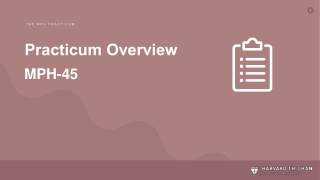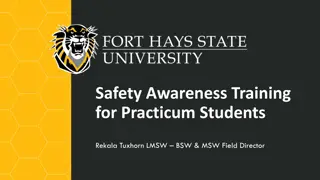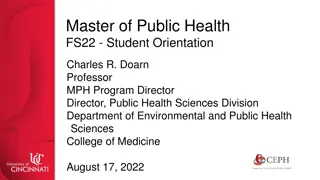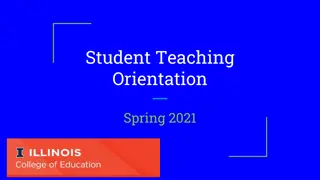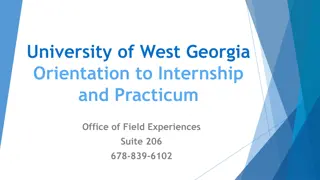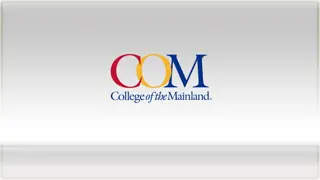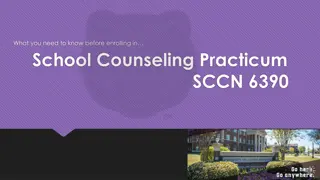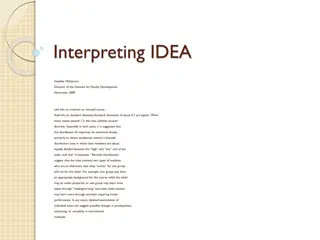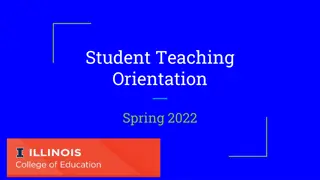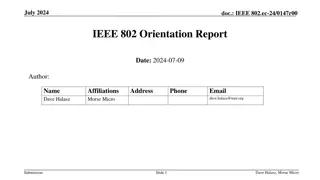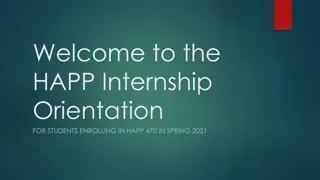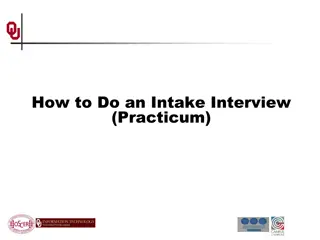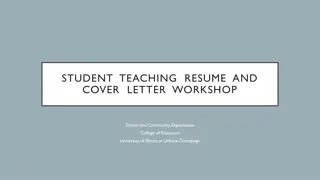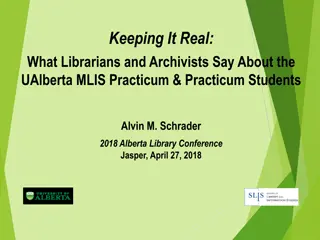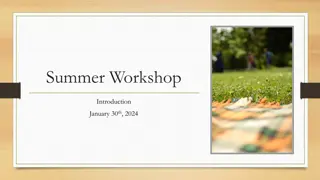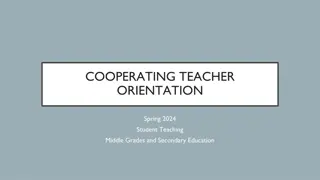Student Teaching Orientation and Practicum Overview
Congratulations on reaching the final phase of your program! This orientation covers key terms, concepts, and expectations for student teaching. Learn about the roles of Student Teachers, Cooperating Teachers, Faculty Supervisors, and Education Program Specialists. Discover the importance of professional conduct during student teaching and how to reach out to your Faculty Supervisor. Understand the specific requirements for different program placements such as Elementary Education, Secondary Education, Special Education, and Early Childhood. Make sure to read your welcome email thoroughly for official student teaching dates and essential information.
Download Presentation

Please find below an Image/Link to download the presentation.
The content on the website is provided AS IS for your information and personal use only. It may not be sold, licensed, or shared on other websites without obtaining consent from the author.If you encounter any issues during the download, it is possible that the publisher has removed the file from their server.
You are allowed to download the files provided on this website for personal or commercial use, subject to the condition that they are used lawfully. All files are the property of their respective owners.
The content on the website is provided AS IS for your information and personal use only. It may not be sold, licensed, or shared on other websites without obtaining consent from the author.
E N D
Presentation Transcript
Impacting student learning, one educator at a time. STUDENT TEACHING ORIENTATION
AGENDA Congratulations! Terms and Concepts Student Teaching Practicum Experience Preparation and Requirements Student Teaching Seminar Evaluations Supplemental Standards, Referral, and Remediation Additional Requirements
YOURE ALMOSTHOME! Congratulations on completion of your preparatory courses! Coursework and your minimum 100 hours of Field Observation/Experience have prepared you for the final phase of your program! Student teaching can be compared to an extended job interview. Dress, speak, respond professionally Your school will be assessing you for a potential job.
TERMS AND CONCEPTS Student Teacher (ST) You, a guest and student, fulfilling teaching duties in the classroom under the guidance of a professional and certified teacher. Cooperating Teacher (CT) Host/Mentor teacher. Faculty Supervisor (FS) Approved UOPX faculty member. Education Program Specialist (EPS) The UOPX staff member providing support throughout the student teaching experience; University point of contact for ST, CT and FS.
WHO IS MY FACULTY SUPERVISOR (FS)? When your school arranged your placement, they assigned you a Cooperating Teacher. However, we (the University) must assign a secondary evaluator contracted through UOPX to evaluate and visit you as well. This person is a local UOPX Faculty Member and may also work locally in your education community. Our Faculty Team must assign this University of Phoenix Faculty Supervisor before we can schedule your student teaching dates. Once assigned, we will reach out to you with your dates, and the name and email of your FS. You will want to reach out to him/her 2 weeks prior to your student teaching to schedule your first meeting together.
STUDENT TEACHING PRACTICUM Your placement must match your program. BSED/TED-E Elementary Education Student Teachers should be in an Elementary classroom teaching at least 2 out of the 4 content areas (Math, Language Arts, Science, Social Studies). Please see additional details in below notes. TED-S- Secondary-Student Teachers should be in a classroom with their approved corresponding content area. SPED Special Ed. Student Teachers should be in a mild-to-moderate classroom. ECH Early Childhood - Student Teachers will complete student teaching in one (K 3rd grade) setting. Please note, that certain states for ECH may have different requirements. Official student teaching dates are provided within your welcome email (sent approximately 3 weeks prior to student teaching. Read your welcome email thoroughly and save this information as a reference for your entire experience.
STUDENT TEACHING REQUIREMENTS Attendance: Student teaching is a full-time position. Student Teachers are required to be in class during the same contracted hours as the Cooperating Teacher. Follow the district calendar, attendance policy, call-in procedures, etc., and attend after hours professional development opportunities. Absences: Emergency absences must be documented. Contact your CT, FS and EPS, send the signed absence form to your EPS for recording and to adjust your end date. Student Teachers are allotted 5 absences for use in the case of an emergency and will need to be made up. No exceptions are made to the attendance policy. Should a Student Teacher incur over 5 absences, the Student Teacher will risk being withdrawn from student teaching experience and the seminar course. Please consult with your EPS regarding inclement weather or other extenuating circumstances.
STUDENT TEACHING REQUIREMENTS, CONT. Lesson Plans All lessons and activities taught by the Student Teacher require a lesson plan, submitted and approved by the CT 48 hours in advance. Submit lesson plans a minimum of 48 hours in advance to CT (or sooner if your CT requires it) for review/feedback. Make adjustments to lesson plans as requested. Organize lesson plans into a notebook that is available at all times for review. Make notebook available to Faculty Supervisor. Keep this for future job interviews as well. Send lesson plans to Faculty Supervisor at least 48 hours prior to observation-or as directed by your Faculty Supervisor.
STUDENT TEACHING REQUIREMENTS, CONT. Seminar Course You will take a 12-week seminar course that will guide you through your assignments while student teaching. Begins approximately 1 to 2 weeks after the start of student teaching. Follow up with your academic counselor. Main Component- edTPA: An assessment to ensure that all beginning teachers are prepared to teach effectively. Student Teachers will need to demonstrate what they can and will do in the classroom to help all students learn. Encourages feedback and self-reflection that nurtures professional growth and preparation for classroom instruction. Documentation of classroom work by submitting a portfolio that includes artifacts and commentaries. No student s last name should appear on any materials submitted nor should they be made public in any way. Permission forms are required.
ACADEMIC LANGUAGE There are language demands that Student Teachers will need to consider as they plan to support student learning of content. edTPA definitions of Academic Language: Oral and written language used for academic purposes. The means by which students develop and express content understandings. Represents the language of the discipline that students need to learn and use to participate and engage in meaningful ways in the content area.
3-5 CONSECUTIVE LESSON PLAN SEGMENT A set of 3 5 lessons that build one upon another toward a central focus (big picture), with a clearly defined beginning and end. Discuss and identify the central focus with your Cooperating Teacher and agree upon a schedule for the 3 - 5 consecutive lesson plan teaching segment. Saving multiple artifacts will allow the Student Teacher opportunities to choose from several different scenarios. Teaching Area Candidate Classroom Materials (Artifacts) Lesson plans, instructional materials, student assignments, assessments, commentary justifying how plans meet student learning needs Unedited video clips, commentary analyzing student engagement in learning Samples of student work, feedback to focus students, commentary analyzing student learning and justifying next steps for teaching Planning Instruction Assessment 1 1
TK20 Tk20 Field Experience Binder Instructions about how to use Tk20 are located in the link below: https://multimedia.phoenix.edu/education/teacher- program-handbook/ 1. One lesson plan a week uploaded in the Lesson Plan tab in Tk20. This can be any lesson or the lesson that your FS would like to see from you weekly. 2. In the Weekly Reflection Tab you will want upload your weekly reflection in the format set by your FS. 3. In the Acknowledgements Tab you will make sure you have acknowledged all items in this tab. Please see TK20 Guide instructions. 4. In the Assessment tab, you can view your feedback from your weekly reflections, evaluations etc. Please see TK20 Guide Instructions 1
12 WEEK SUGGESTED SCHEDULE Prior to First Week: Orientation meeting with CT and Faculty Supervisor to discuss expectations; complete orientation checklist form (with CT and Faculty Supervisor) Week 1: Student Teacher observes and assists with classroom preparation; download and review edTPA Assessment Handbook Week 2: Student Teacher begins assisting with lessons; Student Teacher begins seminar; register for edTPA Week 3: Informal observation 1 by Faculty Supervisor Weeks 4-5: Student Teacher presents additional lessons and classroom responsibilities increase Week 6: CT and Faculty Supervisor complete midterm evaluations, due in Tk20; student responsibilities increase to near full-time. Faculty Supervisor also submits grade form Weeks 7-8: Student Teacher begins teaching full-time Week 9: Student Teacher continues to plan and teach full-time. Weeks 10-11: Full-time teaching Week 12: CT and Faculty Supervisor complete final evaluations: transition lessons/classroom back to CT. Faculty Supervisor submits final grade form; proof of edTPA portfolio submittal in the portfolio section of Tk20 to course instructor. Please Note, that some states will require more then 12 weeks, and the additional suggested schedule is listed in the College of Education Resource below: Please see suggested schedule in the College of Education resource below: https://multimedia.phoenix.edu/education/teacher-program-handbook/ .
EVALUATIONS Informal Observation (week 3) Informal observations are conducted by your Faculty Supervisor. Your Faculty Supervisor will complete an Informal Observation and input feedback into TK20. Midterm and Final Evaluations (week 6 and 12) The assessment instrument used by the CT and the FS, submitted in Tk20. Midterm and Final Grade Forms The assessment instrument submitted only by the Faculty Supervisor to provide a quantitative evaluation. FS will collaborate with CT to decide upon score. Midterm Grade B or better to continue in student teaching and the seminar course. Final Grade equals 50% of seminar grade. Student Teachers must earn a minimum of 42 out of 50 points on the midterm and final grade forms in order to pass student teaching ( B or better).
PROFESSIONAL EXPECTATIONS Supplemental Standards The Supplemental Standards address a candidate s affective attributes and disposition to be an educator/administrator. Review the Professional Dispositions Rubric for additional guidance in the Teacher Education Program Handbook: https://multimedia.phoenix.edu/education/teacher-program- handbook/#Pr_8 Referral The process used to support students who fall below the Supplemental Standards.
IMPROVEMENT PLANS Student Teachers falling below academic standards fall short of Supplemental Standards and will receive remediation. Your CT/FS will contact your EPS with performance/conduct concerns. You will receive an Improvement Plan while in student teaching, to assist with areas of concern. If you are having problems, do not wait until the midterm evaluation to contact your EPS! The Improvement Plan is a collaborative effort involving student input and feedback from the Cooperating Teacher, Faculty Supervisor and EPS to support student success. Student Teachers receive two opportunities to successfully complete student teaching.
PROFESSIONAL DRESS FOR STUDENT TEACHING As you prepare for your student teaching, please review the Dos and Don ts on the chart representing common standards for appropriate professional attire (next slide). Please consider that there will likely be exceptions to the attire listed in this chart in an educational setting. For example: You may find that a suit is only appropriate during an interview or that tennis shoes are allowed on your school s campus. Please be sure to review your school site s expectations for professional attire (employee handbook) and, when in doubt, always error on the side of more professional dress.
PROFESSIONAL DRESS FOR STUDENT TEACHING, CONT. Depends on setting verify with supervisor Do Don t Khakis/Dockers/Dress Slacks, worn at waist Skirts, mid-thigh or longer Capri pants, mid-calf or longer Suits Button down shirts with collars or blouses, short or long sleeve Shorts Polo/golf shirts Mini skirts Denim jeans or shorts Leggings or spandex Athletic wear/sweats Hats * Denim/corduroy/leather Sweatshirts/hoodies Sneakers/tennis shoes Crop tops/midriff exposed/spaghetti straps/tank tops Sweaters Dress shoes or dress sandals Flip flops, tennis shoes/sneakers Clothing with holes, frayed ends Exposed undergarments (bra straps, boxers), fishnet stockings
ADDITIONAL REQUIREMENTS FOR SUCCESS Be professional at all times and during all interactions with parents, students, co-workers and UOPX representatives Professional conduct is courteous and respectful. Keep your school, CT, FS informed: Debrief with your CT for at least 15 minutes daily maintain open and cordial communications. Weekly Reflections: Send your FS weekly messages, including a weekly summary (areas of strength, improvement, questions, reflection) under the Weekly Reflections tab in Tk20. Read and abideby the district s Faculty Handbook. Meetwith the site principal; make sure he/she knows your name, content area, and develops a favorable impression of you! You are responsible for advocating for yourself, ask for feedback and ask questions. This is your opportunity to learn.
ADDITIONAL REQUIREMENTS FOR SUCCESS, CONT. Confidentiality: Do not post any information regarding your student teaching experience in any type of public or social forum (i.e. pictures, videos, student names, personal Identifiable information, etc.) Adaptto your classroom. The teaching style, behavior management strategies and methods are up to your CT. Stay in contact. If you have questions or concerns, please reach out. Don t wait until it s too late. Remember the basics: ask your CT for a school handbook and make sure you re abiding by the dress code, parking in the proper area, arriving on time and leaving when the CT is contracted to leave. Get acquainted with the school, the technology, and resources available. Remember that you are a guest. It is a privilege and an honor to student teach. Keep this in mind at all times and make wise decisions regarding your behavior.
ADDITIONAL REQUIREMENTS FOR SUCCESS, CONT. Take initiative and advocate for yourself. Reach out for feedback and implement it happily. You are responsible for your own success. This will be a challenging experience, but also exciting, rewarding and well worth the effort! Stay on top of your assignments and plan ahead. Your degree and teaching certificate are just around the corner!
RESOURCES Making Good Choices edTPA FAQs edTPA Handbooks Certification Requirements
THANK YOU! Thank you for joining us as we all work together to: Impact student learning, one educator at a time. Questions? Please contact your Education Program Specialist




